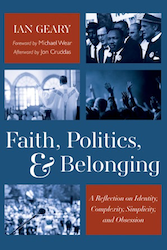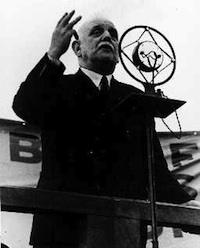CHRIS WILSON reviews a new collection of essays that aims to put Christianity at the heart of left politics, but fails to offer a coherent vision of a democratic socialist future.
Ian Geary’s collection of essays, Faith, Politics and Belonging, will be of interest to all those wishing to explore ethical socialism. He offers insight and challenge, writing with clear sincerity from the perspective of a Blue Labour partisan.
 The book is divided into three sections – headed by each of the three words in the book’s title – with an afterword by former Labour MP Jon Cruddas. Secular socialists might be tempted to focus only on the last two – ‘Politics’ and ‘Belonging’ – but that would be a mistake. Geary’s lively evangelical faith (deriving from the Salvation Army, and drawing on theologians such as Dietrich Bonhoeffer) informs his analysis and provisional conclusions.
The book is divided into three sections – headed by each of the three words in the book’s title – with an afterword by former Labour MP Jon Cruddas. Secular socialists might be tempted to focus only on the last two – ‘Politics’ and ‘Belonging’ – but that would be a mistake. Geary’s lively evangelical faith (deriving from the Salvation Army, and drawing on theologians such as Dietrich Bonhoeffer) informs his analysis and provisional conclusions.
As a fellow Christian socialist, I cannot agree with all of his contentions. His uncritical defence of scripture as the lens through which to view society is – to me – problematic, especially when he writes: “I hold that the Bible is true and sufficient in all matters.”
All texts, including scripture, have a context and most Christians would not argue for such a literalist interpretation. Higher biblical criticism should at least be acknowledged, as well as the whole discipline of contextual theology.
Having said that, Geary rightly observes the quest for biblical imperative, and consequent theological emphasis upon “human flourishing”. His critique of capitalism also resonated, but I was disappointed that, while offering a powerful critique of liberalism, he seems to conclude that little can be done, writing, “while there is no alternative to capitalism, capitalism is no alternative”. So where does that leave us?
I was also disappointed to find only one reference to the Rochdale Pioneers. It would have been good to have had some further consideration of the co-operative movement, not least as co-operation finds favour within the Catholic social teachings that Geary admires.
But perhaps I am being unfair. I greatly enjoyed his chapter on Keir Hardie and discussion about “stirring up divine discontent”. I also thought his concerns about assisted dying are powerful and timely.
Like him, I find it difficult to see how the proposals will not radically change the core values of society and the core business of health care, palliative care and protection of the elderly and vulnerable. His chapter on the issue should be read by anyone interested in the current controversy.
Rights & reflection
I liked his strong advocacy of trade union rights, collective bargaining and having workers on the boards of companies. He rightly identifies the need to reduce the gender pay gap, seeing these issues as rooted in Christian imperatives for social justice as well as his own appreciation of Catholic social teachings. The left has neglected questions of ownership and control of industry and while he says little on the former, his interest in the latter is to be commended and shared.
There is also something for secular readers to learn from his chapter on prayer. Taking time to reflect (if you prefer) is a vital part of effective political praxis. Again, the author is on to something here, but communicating that idea to people who do not share his (and my) faith will always be difficult. Reflection, time out and time alone, really matter. Maybe we can start there.
Geary’s primary identity is as a Christian, but unfortunately this means he embraces Christian Conservatives and Christian Liberal Democrats as allies in a common cause, while his sympathies include Iain Duncan Smith’s Centre for Social Justice as well as Phillip Blond’s Red Tories.
There is more logic, for me, in his sympathy for David Cameron’s notion of the Big Society, although it is not something I share. My Christianity takes me to socialism as the political outworking of the discipleship of Christ, and therefore my allies in that political aspiration are secular socialists, not Conservative Christians.
It’s not always clear from the book what Geary’s socialism means other than improved trade union rights, worthy welfare reforms – such as tax credits and tax breaks for married couples -– and the work of groups such as Christians Against Poverty, Street Pastors and the Evangelical Alliance.
He does reference the Hungarian economist Karl Polanyi and his critique of commodification, acts of “de-sacralisation”, but it’s not clear what Geary’s alternative vision is. I would liked to have read more on alternative Christian economic models.
The author’s belief in the common good is continually underscored, yet he dismisses Acts 2:44-45 as not being about common ownership (disciples holding goods in common) so much as “life in common”. I cannot agree. Early Christians were trialling different economic structures, new ways of living and being in the world; this area too deserves wider debate.
Too romantic
I fear his idea of the working class is also too romantic, particularly the working class of the past with large vibrant trade unions; a strong sense of place, family (and church going); an appreciation of the common good and common sense; and adherence to the idea that the more you pay for benefits the more you should get out. He holds up George Lansbury (pictured left) as a much loved Labour leader who epitomised this era.
 I am not convinced that this sense of decency (and solidarity), while certainly held by some, was ever as widespread as he (or I) would sometimes like to wish. The working class was never homogenous (consider religious sectarianism), while in the 1930s, for example, some working class people supported the British Union of Fascists. What’s more, as a pacifist, Lansbury would have been little good against Hitler’s war machine.
I am not convinced that this sense of decency (and solidarity), while certainly held by some, was ever as widespread as he (or I) would sometimes like to wish. The working class was never homogenous (consider religious sectarianism), while in the 1930s, for example, some working class people supported the British Union of Fascists. What’s more, as a pacifist, Lansbury would have been little good against Hitler’s war machine.
I am also puzzled by Geary’s argument that our politicians have become less popular because they are less representative of the working class. The truth is surely more complex. Tony Blair was popular (but middle class); Clement Attlee (educated at Haileybury Public School) was radical. And what about all those working-class Tories? It is not that class doesn’t matter, but do working class origins automatically make someone more socialist? There is no simple class determinism.
Geary argues that liberalism has run its course, and that we need to return to living “in the love of the common people”. This means accepting Brexit, understanding UKIP as a working-class revolt, and – if I have understood correctly – learning, not just from Maurice Glasman (Blue Labour) and Jon Cruddas (Compass), but also Australian Labor leaders such as Kevin Rudd.
A whole chapter is devoted to “woke” ideas and whether the left has deliberately promoted “cultural Marxism” since the end of the Cold War when leftist economic models were questioned. I have heard this view expressed in Christian circles before and I don’t buy it. Nor can I agree that liberalism (whether economic or social) is exhausted. The recent success of the Liberal Democrats suggests otherwise.
That is not to say Geary isn’t right to articulate his key theme – that we find who we are through place, relationships and the traditions which bind us. All these things are valuable. And while liberalism would reduce us to competitive rational individuals, it is socialism that understands identity comes from community.
Geary gets this, and on this point I whole-heartedly agree. I just think we can do better than aim for reformism based on Christian humanism. I still call my vision democratic socialism, a vision rooted in faith but drawing inspiration for its commonality and solidarity from people of all faiths and none.
—-
Reverend Chris Wilson is a church minister, an active trade unionist and a Christian socialist.
Faith, Politics, and Belonging: A Reflection on Identity, Complexity, Simplicity and Obsession by Ian Geary is published by Wipf and Stock and available from their website for £23 (paperback) and £35 hardback.
Or you can claim a 40% discount here using the code BELONGING.
Details of three forthcoming launch events for the book are available here.
See also: ‘Keir Hardie & the Sacred Cause’ by Chris Wilson.


